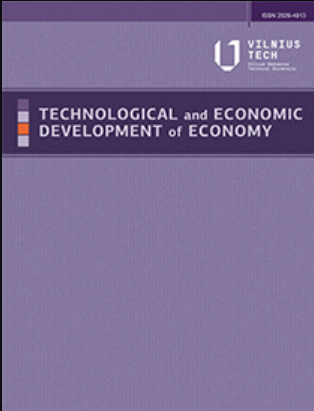INTERCONNECTIONS AND INTERDEPENDENCIES OF ECONOMIC DEVELOPMENT AND SHADOW BANKING SECTOR IN DEVELOPING AND TRANSITIONAL ECONOMIES
IF 4.8
2区 经济学
Q1 ECONOMICS
引用次数: 0
Abstract
The research objective is defined as the identification and confirmation of empirical relationships between shadow banking activities and economic development in developing and transitional economies to establish a theoretical basis for minimizing potential risks associated with shadow banking. The methodological design is based on a quantitative approach, implemented through correlation-regression analysis and ARIMA forecasting methods. The research findings confirm Hypothesis 1: China’s shadow banking is closely interconnected with the country’s economic development. However, Hypothesis 2 (the reduction of shadow banking in China contributes to per capita GDP growth) is only supported for specific structural elements of shadow banking that contribute to economic overheating. In contrast, for other structural elements, such as entrusted loans, a strong direct correlation exists, promoting a positive impact of shadow banking on the country’s economic development. This highlights the need for a highly balanced state policy to minimize shadow banking risks. The research results can be valuable for professionals in public administration and academic researchers, particularly in terms of shaping future research directions.发展中和转型期经济体经济发展与影子银行部门的相互联系和相互依存关系
研究目标是确定和确认发展中经济体和转型经济体的影子银行活动与经济发展之间的经验关系,为最大限度地降低与影子银行相关的潜在风险奠定理论基础。方法设计以定量方法为基础,通过相关回归分析和 ARIMA 预测方法实施。研究结果证实了假设 1:中国的影子银行与中国的经济发展密切相关。然而,假设 2(中国影子银行的减少有助于人均 GDP 的增长)仅在影子银行的特定结构要素导致经济过热时得到支持。相反,对于其他结构要素,如委托贷款,则存在很强的直接相关性,促进了影子银行对国家经济发展的积极影响。这凸显了国家政策高度平衡以最大限度降低影子银行风险的必要性。研究成果对公共管理领域的专业人士和学术研究人员很有价值,特别是在确定未来研究方向方面。
本文章由计算机程序翻译,如有差异,请以英文原文为准。
求助全文
约1分钟内获得全文
求助全文
来源期刊
CiteScore
10.00
自引率
8.50%
发文量
66
审稿时长
15 weeks
期刊介绍:
Technological and Economic Development of Economy is a refereed journal that publishes original research and review articles and book reviews. The Journal is designed for publishing articles in the following fields of research:
systems for sustainable development,
policy on sustainable development,
legislation on sustainable development,
strategies, approaches and methods for sustainable development,
visions and scenarios for the future,
education for sustainable development,
institutional change and sustainable development,
health care and sustainable development,
alternative economic paradigms for sustainable development,
partnership in the field of sustainable development,
industry and sustainable development,
sustainable development challenges to business and management,
technological changes and sustainable development,
social aspects of sustainability,
economic dimensions of sustainability,
political dimensions of sustainability,
innovations,
life cycle design and assessment,
ethics and sustainability,
sustainable design and material selection,
assessment of environmental impact,
ecology and sustainability,
application case studies,
best practices,
decision making theory,
models of operations research,
theory and practice of operations research,
statistics,
optimization,
simulation.
All papers to be published in Technological and Economic Development of Economy are peer reviewed by two appointed experts. The Journal is published quarterly, in March, June, September and December.

 求助内容:
求助内容: 应助结果提醒方式:
应助结果提醒方式:


